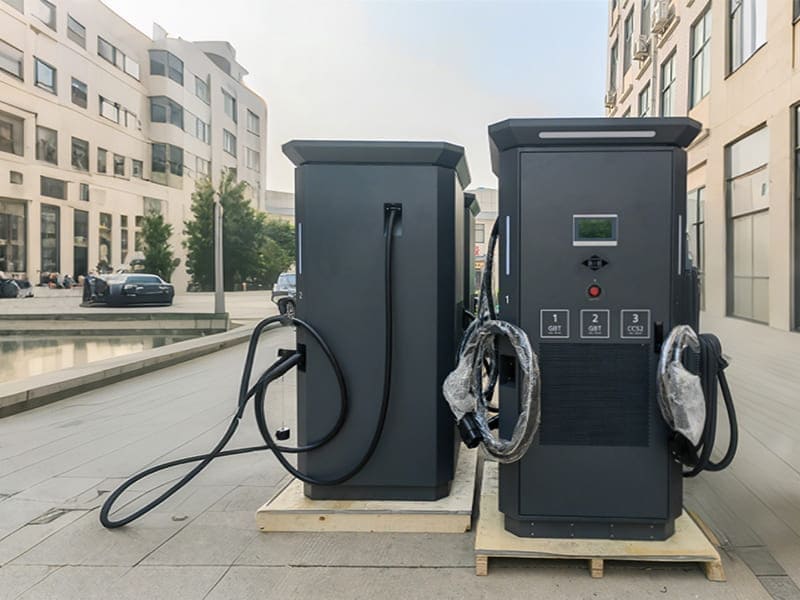The electric vehicle revolution demands robust infrastructure. Many businesses are now considering a 380V EV charging station. This high-power solution promises exceptional performance. But is it truly suitable for commercial applications? This article will explore its viability. We will examine the key benefits and important considerations.
A 380V EV charging station operates on a three-phase power system. This is common in commercial and industrial buildings. Consequently, it delivers power much faster than standard home chargers. Therefore, it is ideal for locations with high vehicle turnover.
Understanding the Power Advantage
The primary advantage is charging speed. A 380V EV charger station provides significantly more power. It can deliver from 22kW up to 22kW and beyond. This drastically reduces vehicle downtime for drivers.
For a commercial fleet, this speed is transformative. Vehicles can be recharged during short breaks. This efficiency boosts overall operational productivity. Moreover, it enhances the customer experience at retail locations.
This system is fundamentally different from home charging. Residential units typically use a single-phase 230V supply. Consequently, a 380V EV charger station is a specialized commercial tool.
Ideal Commercial Applications
Many venues perfectly suit a 380V EV charger station. Fleet depots are a primary example. Delivery vans and taxis can recharge quickly between shifts. This keeps them on the road and generating revenue.
Public charging hubs also benefit greatly. A 380V EV charger station offers a fast, reliable service. This encourages customer loyalty and repeat business. It is a valuable amenity for modern businesses.
Shopping centers and entertainment complexes are ideal hosts. Visitors can gain substantial range while shopping. Meanwhile, corporate offices can offer it as an employee benefit. A 380V EV charging station serves many purposes.
Key Considerations for Implementation
Businesses must assess their electrical capacity first. Installing a 380V EV charger station requires a robust power supply. An upgraded electrical panel is often necessary. Therefore, a professional site assessment is crucial. What is the difference between a 240V and 120V EV charging station?
The total cost of ownership is another factor. This includes installation, hardware, and maintenance costs. However, the investment can be offset by usage fees. Additionally, many governments offer installation incentives.
Ongoing maintenance and support are essential. A reliable partner ensures your 380V EV charging station operates smoothly. This minimizes downtime and maximizes return on investment.
Aegen: A Provider of Commercial-Grade Solutions
Aegen manufactures robust EV charging equipment. Their product range includes commercial DC fast chargers. These units are designed for high-traffic locations. They are a reliable choice for a 380V EV charger station deployment.
Aegen offers comprehensive technical support for free. This is a significant advantage for businesses. They also provide customization options. This ensures the hardware meets specific site requirements.
The company has a proven global track record. Their stations are operational across Europe and the Middle East. This experience translates into reliable products for your business.
Comparing AC and DC Commercial Systems
Commercial charging comes in two main forms. DC fast chargers are the most powerful option. They are ideal for highway stations and busy depots. However, a 380V AC EV charger station is also very effective.
AC systems are often more cost-effective to install. They are perfect for destinations where cars park longer. A 380V EV charging station in AC mode is a versatile solution. It provides a good balance of speed and cost.
Ultimately, the choice depends on your specific needs. A mixed approach often works best for large sites. This strategy caters to different users and vehicles.
Future-Proofing Your Commercial Investment
The EV market is evolving rapidly. Investing in a 380V EV charging station is a forward-thinking move. It prepares your business for increasing EV adoption. This infrastructure will become a standard customer expectation.
Furthermore, this technology supports various business models. You can operate it as a paid service. Alternatively, offer it as a free value-added amenity. A 380V EV charger station adds tangible value to any commercial property.
Conclusion: A Resounding Yes for Commerce
In conclusion, a 380V EV charging station is highly suitable for commercial use. Its superior charging speed meets the demands of business. It enhances customer service and operational efficiency.
Partnering with an experienced manufacturer is key. Companies like Aegen provide the necessary hardware and support. Therefore, businesses can deploy this technology with confidence.
The transition to electric mobility is undeniable. Installing a 380V EV charging station is a smart commercial decision. It positions any business for a sustainable and profitable future.

